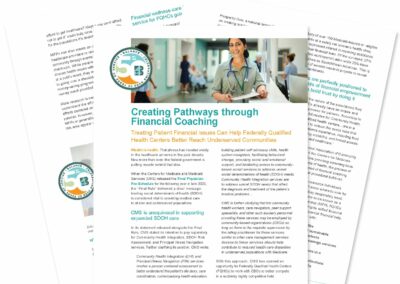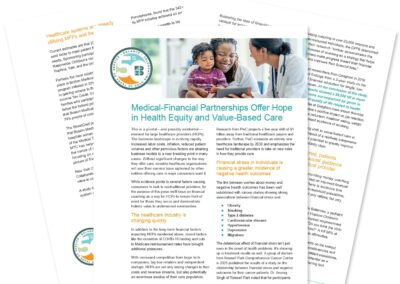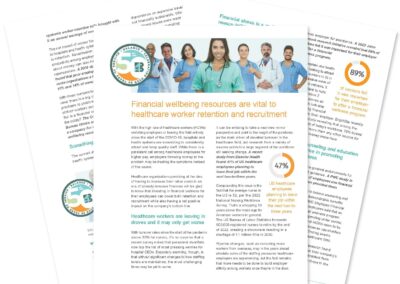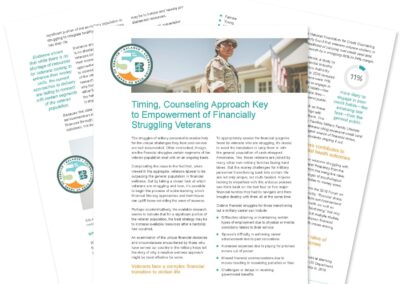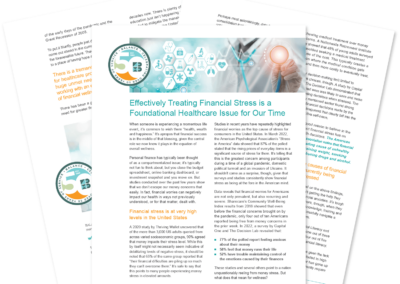Effectively Treating Financial Stress is a Foundational Healthcare Issue for Our Time
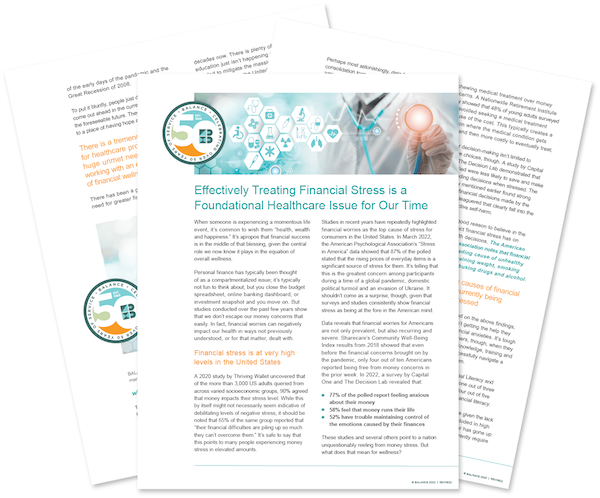
Thank you for your interest in our white paper, Effectively Treating Financial Stress is a Foundational Healthcare Issue for Our Time.
Please click the button below to view and download the white paper or continue to read the web version.
Related Resources
When someone is experiencing a momentous life event, it’s common to wish them “health, wealth and happiness.” It’s apropos that financial success is in the middle of that blessing, given the central role we now know it plays in the equation of overall wellness.
Personal finance has typically been thought of as a compartmentalized issue; it’s typically not fun to think about, but you close the budget spreadsheet, online banking dashboard, or investment snapshot and you move on. But studies conducted over the past few years show that we don’t escape our money concerns that easily. In fact, financial worries can negatively impact our health in ways not previously understood, or for that matter, dealt with.
Financial stress is at very high levels in the United States
A 2020 study by Thriving Wallet uncovered that of the more than 3,000 US adults queried from across varied socioeconomic groups, 90% agreed that money impacts their stress level. While this by itself might not necessarily seem indicative of debilitating levels of negative stress, it should be noted that 65% of the same group reported that “their financial difficulties are piling up so much they can’t overcome them.” It’s safe to say that this points to many people experiencing money stress in elevated amounts.
Studies in recent years have repeatedly highlighted financial worries as the top cause of stress for consumers in the United States. In March 2022, the American Psychological Association’s “Stress in America” data showed that 87% of the polled stated that the rising prices of everyday items is a significant source of stress for them. It’s telling that this is the greatest concern among participants during a time of a global pandemic, domestic political turmoil and an invasion of Ukraine. It shouldn’t come as a surprise, though, given that surveys and studies consistently show financial stress as being at the fore in the American mind.
Data reveals that financial worries for Americans are not only prevalent, but also recurring and severe. Sharecare’s Community Well-Being Index results from 2018 showed that even before the financial concerns brought on by the pandemic, only four out of ten Americans reported being free from money concerns in the prior week. In 2022, a survey by Capital One and The Decision Lab revealed that:
- 77% of the polled report feeling anxious about their money
- 58% feel that money runs their life
- 52% have trouble maintaining control of the emotions caused by their finances
%
Of people with debt also have a mental health diagnosis.
When someone is experiencing a momentous life event, it’s common to wish them “health, wealth and happiness.” It’s apropos that financial success is in the middle of that blessing, given the central role we now know it plays in the equation of overall wellness.
Personal finance has typically been thought of as a compartmentalized issue; it’s typically not fun to think about, but you close the budget spreadsheet, online banking dashboard, or investment snapshot and you move on. But studies conducted over the past few years show that we don’t escape our money concerns that easily. In fact, financial worries can negatively impact our health in ways not previously understood, or for that matter, dealt with.
A 2020 study by Thriving Wallet uncovered that of the more than 3,000 US adults queried from across varied socioeconomic groups, 90% agreed that money impacts their stress level. While this by itself might not necessarily seem indicative of debilitating levels of negative stress, it should be noted that 65% of the same group reported that “their financial difficulties are piling up so much they can’t overcome them.” It’s safe to say that this points to many people experiencing money stress in elevated amounts.
Studies in recent years have repeatedly highlighted financial worries as the top cause of stress for consumers in the United States. In March 2022, the American Psychological Association’s “Stress in America” data showed that 87% of the polled stated that the rising prices of everyday items is a significant source of stress for them. It’s telling that this is the greatest concern among participants during a time of a global pandemic, domestic political turmoil and an invasion of Ukraine. It shouldn’t come as a surprise, though, given that surveys and studies consistently show financial stress as being at the fore in the American mind.
Data reveals that financial worries for Americans are not only prevalent, but also recurring and severe. Sharecare’s Community Well-Being Index results from 2018 showed that even before the financial concerns brought on by the pandemic, only four out of ten Americans reported being free from money concerns in the prior week. In 2022, a survey by Capital One and The Decision Lab revealed that:
- 77% of the polled report feeling anxious about their money
- 58% feel that money runs their life
- 52% have trouble maintaining control of the emotions caused by their finances
